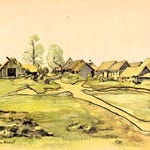
I am making all three segments of Chapter 10 free to all readers. I want you to get a good glimpse of the humanity of these students, how they could have fun together, their dynamics in a group setting, simply their silly, serious selves.
July 19 - July 22, 1942.
Summary:
Willi Graf decides that Oscar Baez is all right, though he still worries about his sister’s nuptials. He heads back to Munich, relieved that he was wrong about Ossy.
On the overnight train ride, he reads Richard Benz’s Lösung und Bindung: Probleme der Kulturen [Unraveling and Binding Up: The Problems of the Cultures]. Benz was a Nazi philosopher who sought to make Nazi hate palatable with beautiful words. Willi’s choice of reading material is puzzling, unless he is reading it for a class. He never expounds further on the topic.
The soldier students learn that their trip East has been postponed by a day. Willi Graf visits Adalbert Grundel, pleased by the discussion about “things that moved them.” Bertl agrees to store Willi’s treasured books while he is in Russia.
Hans Scholl and Alexander Schmorell tidy up most evidence of White Rose activities. Hans returns the Greif duplicating machine, Alex gives the typewriter back to his neighbor. Together with Willi, they drop in on Lilo.
Lilo is not used to seeing Alex in uniform. It is clear that he is delighted they are being sent to the Russian front, his “true homeland.” But Lilo worries about their assignment, fearing she may never again see Alex.
Hans Hirzel decides to travel to Munich to unravel the White Rose mystery. He intends to confront Hans and Sophie Scholl and determine once and for all whether they are behind the leaflets. He makes an appointment to meet them at 7 p.m., July 22. But since he is unfamiliar with the city, he arrives late.
Hans Scholl’s landlady gives him direction to Manfred Eickemeyer’s studio, where the farewell party is taking place. Hans Hirzel arrives around 9 p.m., after the party has been in full swing for about an hour. Hans Scholl introduces him to everyone present, first and last names. But then he seats the high school boy next to Sophie Scholl.
Hans Hirzel thinks they are talking about “inconsequential things,” like literature and art. He does not immediately perceive the gradual shift to more serious topics.
Why this matters:
It’s interesting: Literally one day before recording this segment, I was attacked on LinkedIn by a misogynist who made the same argument towards women that Richard Benz made about Jewish Germans. I wrote a short three-sentence post, expressing my gratitude that so many people in positions of power had denounced the attempted assassination and all political violence.
The LinkedIn fellow said that the attempted assassination was the fault of “ladies” like me who didn’t know our place, that measures now being taken by the Trump side of the Republican party were our fault. That they were being forced to fight back against “ladies” like me.
I immediately thought of Richard Benz, unaware that this would be today’s segment. How appropriate!
Hate is still hate, no matter how beautiful or ‘apologetic’ the words.This is by far my favorite chapter in our White Rose histories. The students and the adults who love their company are present in all the beauty of their youth. They are so alive, so real.
Their sharing of political jokes? Their getting a wee bit tipsy? Hans Scholl making the faux pas - intentional? - of sitting Hans Hirzel next to Sophie? The debates, the breaking off into private discussion groups? It’s who they were. It’s who we are.
When someone writes the history of our era, they must include not only the serious debates and opinion pieces, but also Ron Filipkowski’s cat Kevin, and Elizabeth Warren’s dog Bailey, and Liz Cheney’s devotion to her kids. We are all people, with our quirks and pet peeves and heartfelt loves and heartrending struggles, and to write anyone - then or now - as superhero or demigod is just plain silly.
It’s also a warning not to put “heroes” on pedestals. If you do, you’ll always be disappointed. Because when Hans Scholl told Hans Hirzel the last names of guests, he widened the Gestapo net in February 1943. Know the people you trust.
In the comments section, please tell us about your experiences with people who deflect blame onto victims, like Richard Benz and the LinkedIn misogynist did.
Also, have you ever been involved with a cause you strongly believed in, only to learn that you really did not like the people spearheading the cause? Talk about it here!
White Rose History, Volume II, pages 126-128.
Corrections to auto-generated transcript:
Instead of protesting the concepts he revealed, she objected to his giving her back his keys. Alex countered, It’s better this way. Take care of them for me. When I get back, I will pick them up again, all right? [Italicized sentences missing from transcript.]
After extracting a promise from the blond beauty to write him, Alex and his friends left. Lilo knew she possibly would never see him again. She recalled, It was simply awful. The prospect of such a comfortless void remained. [Italicized sentences missing from transcript.]
Notes and references
Willi Graf, at home, train ride home, Bertl, thinking about Mathilde’s wedding once in Munich:
In a move typical of some dishonest German literary historians, the Richard Benz work that Willi read is most often listed as having been published by Christian Wegner Verlag in 1946, with no addendum stating that it originally had been released during the Third Reich. Inge Jens and Anneliese Knoop-Graf noted that Willi read the 1939 edition published in Hamburg. They did not footnote the publisher’s name, and I could not find it. Will try again before 2024/2025 update.
Willi Graf’s statement about the clinical rotation: “Ich glaube einfach nicht an die 3 Monate Feldfamulatur” - I simply do not believe in the three-month clinical rotation in the field.
Knoop-Graf, Anneliese and Jens, Inge (Eds.). Willi Graf: Briefe und Aufzeichnungen. Frankfurt am Main: Fischer Taschenbuch Verlag GmbH, 1994.
Benz, Richard. Geist und Reich. Jena: Eugen Diederichs Verlag, 1933. Note that I checked this book out of an American university library!
Wrapping things up - Hans Scholl, Alexander Schmorell, Willi Graf:
September 2, 1942 letter from Hans Scholl to his mother, Sophie, and Inge. “My last two weeks in Munich were grand and worthwhile, but hurried, so they prevented many of my ideas from maturing.”
In Hans Scholl’s 2/20/1943 interrogation, Hans was still trying to claim sole responsibility for the leaflet operations, therefore he stated that he “gave the typewriter back to Schmorell.” However, the typewriter apparently had never left Alex’s room.
Christiane Moll reached a similar conclusion regarding continuation of leaflet activity post-Russia. “Therefore it remains open whether they would have continued distributing their leaflets had they not been sent to Russia at the end of July 1942.”
I do not “buy” Söhngen’s contention that he initiated the political conversation (“I had probably made some strong remark against the regime and particularly about the construction of concentration camps and about the Gestapo, which had carried me off loudly once again”), because nowhere are Söhngen’s ‘dissident’ claims corroborated by third parties. However, he likely did not oppose Hans’ political statements, as Söhngen was not a politically minded fellow.
Re timing of Hans Scholl’s visit: Söhngen said it occurred “immediately before he was sent to the front in August [sic] 1942.”
Söhngen did not attend the farewell party.
Fürst-Ramdohr, Lilo. Freundschaften in der Weiβen Rose. Munich: Verlag Geschichtswerkstatt Neuhausen, 1995.
Jens, Inge (Ed.). At the Heart of the White Rose: Letters and Diaries of Hans and Sophie Scholl. Translation by J. Maxwell Brownjohn. New York: Harper & Row Publishers, Inc., 1987.
Knoop-Graf, Anneliese and Jens, Inge (Eds.). Willi Graf: Briefe und Aufzeichnungen. Frankfurt am Main: Fischer Taschenbuch Verlag GmbH, 1994.
Moll, Christiane. “Acts of Resistance: The White Rose in the Light of New Archival Evidence.” In Resistance Against the Third Reich: 1933-1945, ed. Michael Geyer and John Boyer, translation by Betsy Mayer and Michael Geyer. Chicago: University of Chicago Press, 1992.
Third White Rose Trial: July 13, 1943. Josef Söhngen’s postwar narrative.
ZC13267, Volume 2. 2/20/1943 interrogation of Hans Scholl.
Farewell party, part 1:
Susanne Hirzel stated that her brother had made an appointment to see the Scholls, but that Hans Hirzel found a note telling him to meet them at a different address. One would infer from her narrative that Hans Hirzel had made the appointment before he left Ulm, which was not the case. Susanne Hirzel herself stated that her brother told the truth and did not lie during his Gestapo interrogations. One must therefore assume that Hans Hirzel made the appointment when he got to Munich and called the Scholls.
In Hans Hirzel’s 2/22/1943 interrogation, he incorrectly gave the address of the studio as Ludwig Str. 45.
Susanne Hirzel criticizes Hans and Sophie (and indeed, all the participants that evening) for not having agreed upon an alibi in advance “to justify involvement in such a dangerous meeting.” Her objection seems baseless, as this was first and foremost a farewell party. That was not only alibi, it was the truth.
One of the dark threads to follow throughout White Rose history: Hans Hirzel’s adoration of Hans Scholl and his disappointment every time Hans Scholl ‘stuck him’ with Sophie.
Hirzel, Susanne. Vom Ja zum Nein: Eine schwäbische Jugend 1933-1945. Tübingen: Klöpfer, Mayer und Co. Verlagsgesellschaft mbH, 1998.
Vielhaber, Klaus. Gewalt und Gewissen: Willi Graf und die “Weisse Rose.” Würzburg: Echter-Verlag, 1963. Original title of this book was Widerstand im Namen der deutschen Jugend.
NJ1704, Volume 1, part 1. April 8, 1943 indictment.
ZC14116, Volume 1. 2/22/1943 interrogation of Hans Hirzel; 2/27/1943 interrogation of Hans Hirzel. Publication in 2024/2025.
Podcast © 2024 Denise Elaine Heap. White Rose History, Volume II, Chapter 10, © 2002 Denise Elaine Heap and Exclamation! Publishers. Please contact us for permission to quote.
This podcast is a project of WHY THIS MATTERS, a newsletter of Center for White Rose Studies, that explores the reasons that voices silenced more than eighty years ago still speak to us today.
To order digital version of White Rose History, Volume II, click here. Digital version of White Rose History, Volume I is available here.
To support our work, consider becoming a paid subscriber. - All subscription funds are deposited directly to the account of Center for White Rose Studies, a 501(c )(3) nonprofit. Ask your tax accountant if your subscription is tax deductible.












Share this post